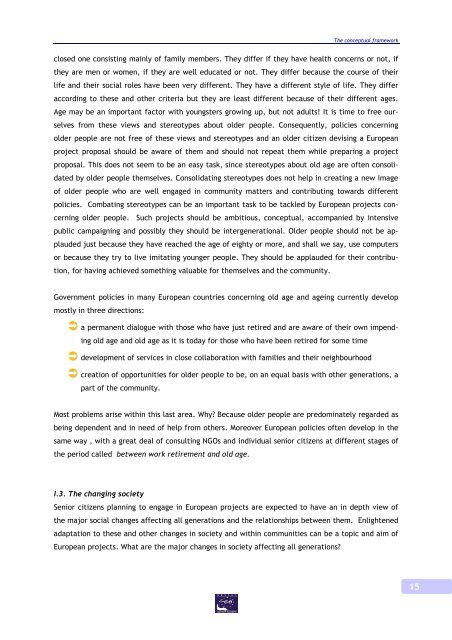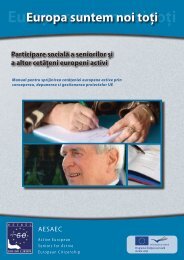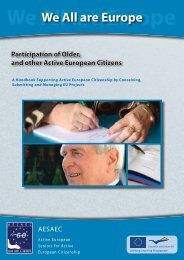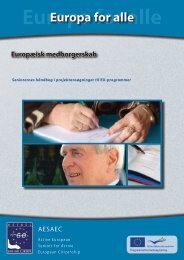We All are Europe - AESAEC
We All are Europe - AESAEC
We All are Europe - AESAEC
You also want an ePaper? Increase the reach of your titles
YUMPU automatically turns print PDFs into web optimized ePapers that Google loves.
The conceptual framework<br />
closed one consisting mainly of family members. They differ if they have health concerns or not, if<br />
they <strong>are</strong> men or women, if they <strong>are</strong> well educated or not. They differ because the course of their<br />
life and their social roles have been very different. They have a different style of life. They differ<br />
according to these and other criteria but they <strong>are</strong> least different because of their different ages.<br />
Age may be an important factor with youngsters growing up, but not adults! It is time to free ourselves<br />
from these views and stereotypes about older people. Consequently, policies concerning<br />
older people <strong>are</strong> not free of these views and stereotypes and an older citizen devising a <strong>Europe</strong>an<br />
project proposal should be aw<strong>are</strong> of them and should not repeat them while preparing a project<br />
proposal. This does not seem to be an easy task, since stereotypes about old age <strong>are</strong> often consolidated<br />
by older people themselves. Consolidating stereotypes does not help in creating a new image<br />
of older people who <strong>are</strong> well engaged in community matters and contributing towards different<br />
policies. Combating stereotypes can be an important task to be tackled by <strong>Europe</strong>an projects concerning<br />
older people. Such projects should be ambitious, conceptual, accompanied by intensive<br />
public campaigning and possibly they should be intergenerational. Older people should not be applauded<br />
just because they have reached the age of eighty or more, and shall we say, use computers<br />
or because they try to live imitating younger people. They should be applauded for their contribution,<br />
for having achieved something valuable for themselves and the community.<br />
Government policies in many <strong>Europe</strong>an countries concerning old age and ageing currently develop<br />
mostly in three directions:<br />
a permanent dialogue with those who have just retired and <strong>are</strong> aw<strong>are</strong> of their own impending<br />
old age and old age as it is today for those who have been retired for some time<br />
development of services in close collaboration with families and their neighbourhood<br />
creation of opportunities for older people to be, on an equal basis with other generations, a<br />
part of the community.<br />
Most problems arise within this last <strong>are</strong>a. Why Because older people <strong>are</strong> predominately regarded as<br />
being dependent and in need of help from others. Moreover <strong>Europe</strong>an policies often develop in the<br />
same way , with a great deal of consulting NGOs and individual senior citizens at different stages of<br />
the period called between work retirement and old age.<br />
I.3. The changing society<br />
Senior citizens planning to engage in <strong>Europe</strong>an projects <strong>are</strong> expected to have an in depth view of<br />
the major social changes affecting all generations and the relationships between them. Enlightened<br />
adaptation to these and other changes in society and within communities can be a topic and aim of<br />
<strong>Europe</strong>an projects. What <strong>are</strong> the major changes in society affecting all generations<br />
15









